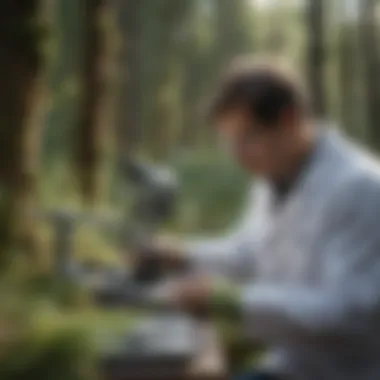Unveiling Diverse Career Paths for Biology Graduates: A Comprehensive Guide


Management and Preservation of Evergreen Forests
Evergreen forests hold a significant ecological importance not just in the United States. Understanding the historical context of American evergreen forests is vital in appreciating the intricate balance of nature within these treasured landscapes. The native practices and the evolution of forest management techniques over time shape our current approach to protecting and preserving these valuable ecosystems.
Research findings continue to shed light on the biodiversity within evergreen forests and provide crucial insights into sustainable management practices. With ongoing conservation efforts at the forefront, American evergreen landscapes are being safeguarded against threats like deforestation and habitat destruction, ensuring their longevity for future generations to enjoy. By emphasizing the importance of conservation, researchers, policymakers, and environmentalists collaborate to implement impactful initiatives that truly make a difference in the preservation of these natural wonders.
Introduction
In the realm of biological sciences, the journey with a degree in biology unfolds into a vast landscape of diverse and engaging career possibilities. This article serves as a guiding beacon, illuminating the troves of opportunities awaiting individuals equipped with a biology degree. Diving into this exploration is not merely about finding a job but immersing oneself in a world where scientific knowledge intertwines with real-world applications across various sectors. As we navigate through the intricacies of biological vocations, each juncture presents a unique trajectory for growth and contribution.
One of the key elements underscoring the essence of the Introduction lies in the spotlight it casts on the pivotal role of a biology degree in shaping the professional trajectory of individuals. It acts as a conduit through which passion for science converges with career aspirations, laying the foundation for a fulfilling and impactful journey ahead. Moreover, the Introduction sets the stage for dissecting the plethora of career paths available, offering a panoramic view of how scientific acumen translates into tangible career progression. Through this lens, individuals embarking on a career with a biology degree gain a nuanced understanding of the multifaceted landscape awaiting their exploration.
Furthermore, the Introduction encapsulates the significance of unveiling the hidden gems tucked within the domain of biology-related professions. By peeling back the layers of conventional wisdom, it reveals a tapestry of roles that stretch beyond the confines of traditional perceptions. This segment thus acts as a catalyst for igniting curiosity and instilling a sense of wonder about the myriad opportunities that burgeon within the field of biology. As readers embark on this intellectual voyage, the Introduction beckons them to partake in a transformative odyssey, where knowledge intertwines with ambition to sculpt a promising career trajectory.
Research Careers
In this extensive article discussing the exploration of career opportunities with a biology degree, the section on Research Careers holds significant importance. Research careers in the field of biology offer individuals a platform to delve deep into scientific inquiry and discovery, driving advancements and innovations across various sectors. These careers are characterized by a strong emphasis on critical thinking, problem-solving, and analytical skills. The ability to conduct thorough research, interpret data, and draw meaningful conclusions are key elements that define the realm of research careers in biology.
Biological Research Scientist
A Biological Research Scientist plays a pivotal role in advancing scientific knowledge and understanding within the field of biology. With a focus on conducting experiments, analyzing results, and contributing to the broader scientific community, biological research scientists are instrumental in pushing the boundaries of biological research. Their work is centered around hypothesis testing, data collection, and the dissemination of findings through research papers and presentations. In addition to working in laboratories, biological research scientists may collaborate with multidisciplinary teams to tackle complex biological questions and challenges.


Biotechnologist
The role of a Biotechnologist is essential in leveraging biological principles and technologies to develop innovative products and solutions. Biotechnologists apply their expertise in areas such as genetic engineering, bioinformatics, and biopharmaceuticals to address critical issues in healthcare, agriculture, and environmental sustainability. By utilizing cutting-edge techniques and methodologies, biotechnologists contribute to the development of novel drugs, genetically modified organisms, and biofuels, among other bio-based products. Their work not only bridges the gap between biology and technology but also drives significant advancements in various industries.
Pharmacologist
Pharmacologists play a vital role in the pharmaceutical and healthcare industries, focusing on studying the effects of drugs on biological systems. These professionals are responsible for conducting preclinical and clinical trials to evaluate the safety and efficacy of new medications, as well as investigating drug interactions and mechanisms of action. Pharmacologists contribute to drug development processes by providing essential data on drug metabolism, pharmacokinetics, and potential side effects. Their work is crucial in ensuring the efficacy and safety of pharmaceutical products before they are released to the market.
Environmental Consultant
Environmental consultants with a background in biology play a key role in addressing environmental challenges and promoting sustainable practices. These professionals work with government agencies, private companies, and nonprofit organizations to assess environmental impacts, develop conservation strategies, and ensure compliance with regulatory standards. By combining their knowledge of biology with environmental science, consultants offer valuable insights into ecosystem preservation, pollution control, and biodiversity conservation. Environmental consultants have a profound impact on shaping policies and practices that promote environmental sustainability and protect natural resources.
Conservation and Environmental Careers
Conservation Biologist
A Conservation Biologist is a vital figure in the field of environmental conservation, focusing on implementing strategies to protect and restore natural habitats and biodiversity. This role involves conducting research to understand ecosystem dynamics, monitoring species populations, and developing conservation plans to mitigate environmental threats. Conservation Biologists often collaborate with governments, conservation organizations, and local communities to create sustainable conservation initiatives. They play a crucial role in preserving endangered species, restoring degraded ecosystems, and advocating for environmental protection policies. With a biology degree, individuals can pursue a career as a Conservation Biologist and contribute to the conservation and sustainable management of natural resources.
Wildlife Biologist
Wildlife Biologists are dedicated to studying and conserving wildlife species in their natural habitats. These professionals conduct field research to track animal populations, assess the impact of human activities on wildlife, and develop conservation strategies to maintain biodiversity. Wildlife Biologists play a vital role in wildlife management, species protection, and the restoration of ecosystems. By employing their scientific knowledge and research skills, Wildlife Biologists contribute to understanding animal behavior, promoting conservation awareness, and implementing measures to mitigate threats to wildlife populations. A biology degree equips individuals with the necessary expertise to embark on a rewarding career as a Wildlife Biologist and work towards preserving wildlife diversity.
Ecologist


Ecologists play a critical role in studying the relationships between organisms and their environments, focusing on the intricate dynamics of ecosystems and habitats. These professionals investigate ecological patterns, conduct biodiversity assessments, and analyze the impacts of environmental changes on plant and animal populations. Ecologists contribute valuable insights to conservation efforts, ecosystem restoration projects, and sustainable land management practices. By applying their knowledge of ecology and environmental science, Ecologists play a pivotal role in promoting environmental sustainability, biodiversity conservation, and ecosystem resilience. Individuals with a biology degree can pursue a career as an Ecologist and engage in research and conservation efforts to protect our natural world.
Park Naturalist
Park Naturalists serve as interpreters of nature, providing education and guidance to visitors in parks, nature reserves, and conservation areas. These professionals deliver environmental education programs, lead guided tours, and engage the public in understanding and appreciating their natural surroundings. Park Naturalists play a key role in promoting conservation awareness, fostering a connection to nature, and advocating for the preservation of protected areas. With their expertise in biology and environmental science, Park Naturalists inspire conservation stewardship, environmental literacy, and a deeper appreciation for the natural world. Individuals interested in environmental education and outreach can pursue a fulfilling career as a Park Naturalist and make a positive impact on conservation efforts.
Healthcare Careers
Healthcare careers play a pivotal role in the vast landscape of opportunities available to individuals with a biology degree. Combining scientific knowledge with a deep sense of compassion and a drive to improve human health, healthcare professionals hold significant responsibilities in various sectors. In this article, the Healthcare Careers section sheds light on the critical contributions that biology graduates can make within the healthcare industry.
Medical Scientist
Medical scientists are key figures in advancing medical knowledge and improving patient care. Through conducting research studies, clinical trials, and experiments, these professionals contribute to the development of new medical treatments and technologies. Their work is instrumental in enhancing our understanding of diseases and finding innovative ways to diagnose, treat, and prevent illnesses. Medical scientists often work in hospitals, laboratories, universities, or pharmaceutical companies, collaborating with clinicians and other researchers to drive progress in healthcare.
Genetic Counselor
Genetic counselors play a vital role in helping individuals and families understand genetic information and its implications. By providing support, guidance, and education, genetic counselors assist clients in making informed decisions about genetic testing, risk assessment, and potential treatments. With a biology background, aspiring genetic counselors can delve into complex genetic concepts, ethical considerations, and communication strategies to offer personalized care to patients dealing with genetic conditions.
Clinical Research Coordinator
Clinical research coordinators act as liaisons between healthcare professionals, researchers, and study participants in clinical trials. These professionals play a crucial role in ensuring that research studies are conducted ethically, efficiently, and in compliance with regulatory standards. From recruiting and enrolling participants to overseeing data collection and monitoring study progress, clinical research coordinators facilitate the smooth operation of clinical trials, contributing to the advancement of medical knowledge and the development of new therapies.
Biomedical Engineer


Biomedical engineers bridge the gap between biology, medicine, and engineering to design innovative healthcare solutions. By applying engineering principles to biological systems and healthcare technologies, biomedical engineers develop equipment, devices, and procedures that improve patient care and enhance medical outcomes. With a biology degree as a foundation, individuals interested in biomedical engineering can explore a realm of possibilities, from creating prosthetics to designing medical imaging systems, contributing to interdisciplinary advancements in healthcare.
Education and Outreach Careers
In the realm of career opportunities with a biology degree, Education and Outreach Careers play a crucial role in disseminating scientific knowledge and inspiring the next generation of scientists. This article aims to shed light on the significance of these careers, emphasizing their impact on shaping scientific literacy and environmental awareness. Education and Outreach Careers not only bridge the gap between complex scientific concepts and the general public but also foster a passion for the natural world.
Science Educator
As a Science Educator, individuals with a biology background have the opportunity to engage with students of all ages, instilling a love for science and critical thinking skills. Science Educators design and deliver lesson plans, conduct hands-on experiments, and cultivate a curiosity for how the natural world functions. Through innovative teaching methods, Science Educators pave the way for future scientists and environmental stewards.
Museum Curator
The role of a Museum Curator in the field of biology showcases the importance of preserving and presenting scientific artifacts and specimens. Museum Curators curate exhibits, conduct research on unique collections, and provide educational programs for visitors. Their work not only preserves scientific heritage but also enhances public understanding of biological diversity and evolution.
Science Writer
Science Writers with a biology degree play a key role in translating complex scientific findings into accessible and engaging content for a broad audience. By crafting articles, blogs, and reports, Science Writers make science easily understandable and relatable to the general public. Their work extends the reach of scientific knowledge beyond academic circles, promoting science literacy and environmental awareness.
Environmental Educator
Environmental Educators specializing in biology focus on promoting conservation, sustainability, and ecological understanding. Through interactive workshops, field trips, and community outreach programs, Environmental Educators raise awareness about environmental issues and encourage action towards a greener future. Their dedication to environmental education empowers individuals to make informed decisions that benefit ecosystems and biodiversity.
Conclusion
Delving deeper, the Conclusion reinforces the importance of strategic career planning and continuous skill development for individuals embarking on their professional journey. By emphasizing the need for adaptability in an ever-evolving job market, it sheds light on the critical aspect of staying abreast of emerging trends and technologies within the biological sciences. Moreover, it accentuates the value of networking and mentorship in fostering career growth and obtaining newfound opportunities within the field.
Furthermore, the Conclusion serves as a compass guiding aspiring biologists towards aligning their personal passions with their career trajectory. It articulates the necessity of striking a balance between job stability and intrinsic fulfillment, encouraging readers to explore niche specializations that resonate with their individual interests and goals. Moreover, it elucidates the importance of seeking professional satisfaction beyond monetary gains, advocating for a holistic approach to career satisfaction deeply rooted in personal fulfillment and meaningful contribution to society.
In essence, the Conclusion offers not just a recapitulation of the discussed career paths but a call to action for readers to embark on their professional voyage equipped with a proactive mindset and a commitment to lifelong learning. It reiterates the never-ending possibilities within the realm of biology, urging individuals to harness their scientific expertise to drive innovation, sustainability, and social impact. Through its insightful reflections and forward-looking vision, the Conclusion empowers readers to chart a course towards a rewarding and fulfilling career within the dynamic sphere of biology.



